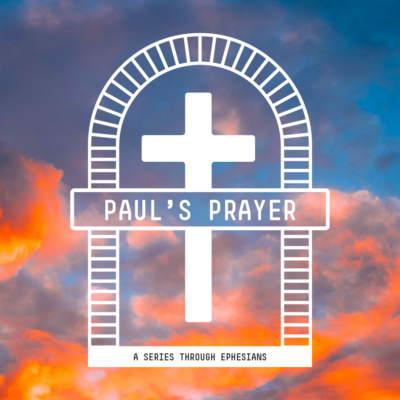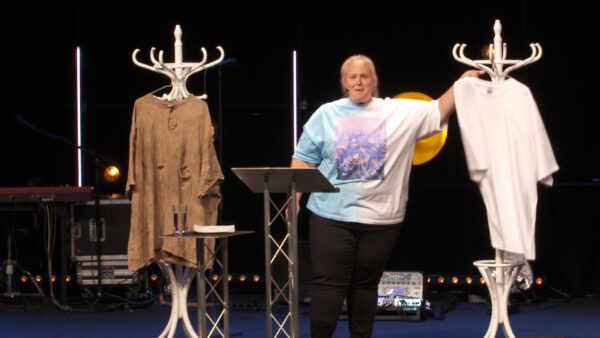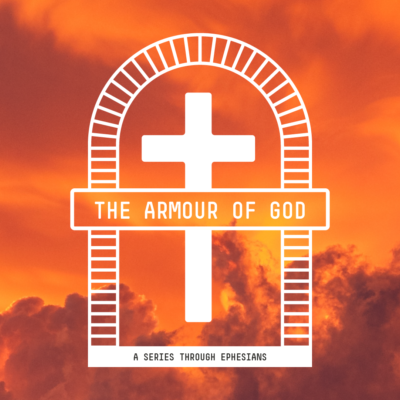It is important to recognise that there are so many things that can impact our view of love and how we receive it.
For example: Hollywood and television, our family, early childhood, life experiences.
Reflect
How would you answer the question “What is Love?”
Are you aware of things have impacted your view of love or how you receive it?
What comes to mind when you hear the expression “God loves you”?
Whatever our existing assumptions about what love is, we can all subconsciously apply our imperfect human ideas of love to the love of God and this can lead to a misunderstanding what God’s love is like at times.
Read together: Ephesians 3:14-21
In this passage Paul reminds us about the sheer magnitude of God’s Love.
He says, “And I pray that you, being rooted and established in love, 18 may have power, together with all the Lord’s holy people, to grasp how wide and long and high and deep is the love of Christ…” The love of God is the widest, longest, highest and deepest thing that any of us could possibly imagine, in fact, Paul says in verse 19 that “this love… surpasses knowledge.”
This was very different from the idea of the supreme god that would have been familiar to the Ephesians Paul was writing to. Ephesus was the second largest city in the Roman Empire, and was a centre for commerce and worship of the Roman gods. The supreme God of the Roman Empire was Jupiter. He was at the top of the hierarchy of all the Roman gods, and had absolute authority. Among things like the weather, he presided over the fates of humans, including whether they lived or died. But he was distant and very frightening. Romans were expected to appease him with sacrifices and risked punishment if they behaved in a way that displeased him.
Paul is saying that God the Father, far from being cruel and angry, ready to punish you, is a loving God who sacrificed himself for us in the form of Jesus.
Maybe your response to the expression “God loves you” was thoughts like:
“That is true for other people.”
“But me? I am unlovable.”
“I am so far from God, his love couldn’t reach me.
“It couldn’t reach as far as my brokenness, my shame, my addiction, the things I have done in my life”.
But in these verses in Ephesians we see that it is wide, long, high and deep enough to reach all of us.
Read together: Romans 8:31-39
In this passage we read that nothing can separate us from the love of God, no matter how far we may have drifted from Him.
Spiritual Exercise
Welsh Christian William Rees, tried to capture God’s incredible love in the hymn “Here is Love Vast as the Ocean”. This hymn became known as the love song of the Welsh Revival, in the early 1900s, when church buildings overflowed and thousands of people came to faith in Jesus.
Listen to the song together, reflecting on the words. You may want to use this YouTube lyric video (link https://youtu.be/izHuv2rhtF4) to focus your attention
Share
- What lyrics stood out to you?
- Did you notice any resistance or any specific parts that you found challenging?
- What is God’s invitation to you?
- What does it mean to know God's love deeply for ourselves?
Paul wants us to go further than grasping the magnitude of God’s love, he wants us to know it in an experiential way.
There is a little paradox in Ephesians 3:19 when Paul prays that they will “…know this love that surpasses knowledge.”
He wants us to know what is way beyond our being able to fully know. To experience the reality of God’s love in ways we can’t fully comprehend.
When he is talking about knowing God’s love, he doesn’t mean the kind of rational understanding we think of when we hear the word “knowledge” today. Knowledge that is to do with what we think (this idea only emerged in the Enlightenment period of the 17th and 18th centuries). To the Greek audience that Paul was writing to, there wasn’t a separation of the rational mind and irrational emotions. The heart was the location of both physical sensations and all thoughts.
So to know something is to experience it, and that is precisely what Paul is praying for here: that his readers would know the truth of God’s love, in both their minds and their experiences.
It is one thing to have money in the bank. It's another thing to withdraw it and spend it.
In the same way it is one thing to know about God’s love, but it is another thing to live in the reality of it.
For this reason
In the previous two talks, we have seen how God’s purpose for his people is to show the glory of God. Paul is exhorting the Church to live out the life that God has called them to, but first he prays for them to know God’s love. Paul knows that we are most effective for the Kingdom, when we deeply know and experience the love that God has for us, and for others. Everything else springs from that place.
Discuss
Discovering more about God’s love for us is a lifelong adventure, which we are all invited into.
- What do you think it means to live in the reality of God’s love?
- If you were to accept the invitation to go deeper, what difference might it make in your life and to those around you?
- How can we grow in experiencing God's love?
Paul prays that we would grasp just how vast God’s love is, and know it in our personal experience.
What does Paul say about how to grow in grasping and knowing it?
Read together: Ephesians 3:17 - 18
“Together with all the Lord’s holy people” - That’s us, the family of God, the Church.
Knowing and living in God’s love is not something we do in isolation.
Yes, of course we can have wonderful experiences of God alone with Him and we are encouraged to seek out time alone with God.
But, in many of his letters, Paul talks about our need for each other, often using the image of a body, including in the verse from Ephesians we are basing our Vision for the year on,-
“From him the whole body, joined and held together by every supporting ligament, grows and builds itself up in love, as each part does its work.” Ephesians 4:16
Paul knows that we are limited in understanding God’s love until we see it working out often through others. We share our experiences of His love, which encourages builds each other up. We express something of the love that God extended to us by caring for one another, looking after each other in good times and bad. We get in touch with God's love at a deeper level when we worship with others. As we express our love to God in worship, we can experience his love at a deeper level.
Pray
“I pray that out of his glorious riches he may strengthen you with power through his Spirit in your inner being. And I pray that you …may have power... to grasp how wide and long and high and deep is the love of Christ.” Ephesians 3:16-18
We need the Holy Spirit to live the life that God has for us, a life serving Him and giving Him the glory. A life “filled to the measure of all the fullness of God” (Eph 3:19)
It’s the Holy Spirit who;
- strengthens us and empowers us to understand and experience what is beyond understanding.
- reminds us of the ultimate source of all true love and affection, giving us identity and purpose.
- helps us to respond to others, sharing with them the sheer magnitude of God’s love.
- Spend some time waiting on the Holy Spirit and ministering to one another.
There may be things people want to share about the distractions and barriers in their lives whether thoughts, feelings, life circumstances and choices that make it hard for them to receive God’s love.
There may be people who feel drawn to share more of God’s love with others around them.









